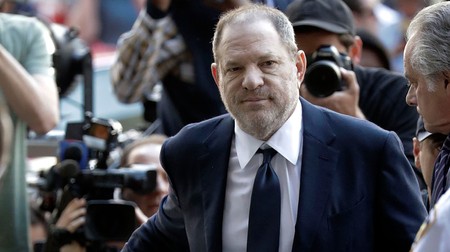Judge Orders Release of Harvey Weinstein’s Employment Contract
By Gene Maddaus
LOS ANGELES (Variety.com) – A Delaware bankruptcy judge on Tuesday ordered the release of Harvey Weinstein’s 2015 employment contract, which included a controversial clause requiring Weinstein to reimburse the company for settlements.
The contract is central to the argument that the Weinstein Co. bankruptcy estate and the company’s board members should be held liable for Weinstein’s sexual harassment and assaults. The plaintiffs in a class action harassment suit filed in New York have alleged that the clause — which provided for indemnification and escalating penalties after each instance — showed that the company effectively condoned Weinstein’s behavior.
“TWC and other defendants not only knew about but endorsed Mr. Weinstein’s conduct,” argued Jeff Waxman, an attorney for the plaintiffs, in bankruptcy court on Tuesday.
The provision in the contract was first reported by TMZ last October. The company, which declared bankruptcy in March, hotly disputes the plaintiffs’ interpretation of the contract provision. The company’s attorneys and an attorney for Weinstein argued unsuccessfully Tuesday that the contract should be kept under seal, saying that it had been mischaracterized in press reports and that it would merely stoke a media firestorm.
Karin DeMasi, an attorney for the company, argued that releasing the contract “will create a media sideshow and force the debtors to expend time and resources defending against distorted descriptions of the agreement in the press.”
DeMasi argued that the penalties described in the document in no way implied an endorsement of Weinstein’s behavior. “There was no ratification,” she said. “There is no endorsement.”
In addition to the settlement provision, the contract also includes details about Weinstein’s compensation and efforts to cut costs at the company. Weinstein received a base salary of $2,626,275, plus a bonus. He was also entitled to up to $500,000 worth of private air travel per year, a car and driver, first class hotel accommodations, and private security. The contract also limited Weinstein to producing, distributing or acquiring five movies per year. It also directed Weinstein to reduce the company’s overhead to $40-45 million in 2016, to $37.5-42.5 million in 2017, and to $35-40 million in 2018.
Scott Cousins, an attorney for Weinstein, also argued that the contract was irrelevant to the legal issues at stake in the bankruptcy. “The media frenzy is something we’re trying to minimize,” he said.
Judge Mary Walrath granted the request from the U.S. trustee’s office to make the document public.
“I note the debtor is no longer operating. This employee has been terminated,” Walrath said. “I don’t know that the commercial information in that contract is of any sensitive nature necessary to protect debtor’s business.”
Walrath also allowed the plaintiffs in the New York class action suit to proceed with their case against the company in federal court. So far as it involves the Weinstein Co., the case had been subject to an automatic stay ever since the Weinstein Co. declared bankruptcy. The company’s attorneys argued that the stay should not be lifted, as it would create a “race to the courthouse” among other plaintiffs, and the company is already bogged down in dealing with other legal matters.
The company’s attorneys also gave an update on the sale to Lantern Capital, which Walrath approved last month. The closing has dragged on longer than expected, as attorneys sort out how the proceeds will be allocated among creditors, which contracts Lantern will assume, and other issues. Attorney Paul Zumbro promised that the closing would occur before the end of June.
Employment Agreement by gmaddaus on Scribd

